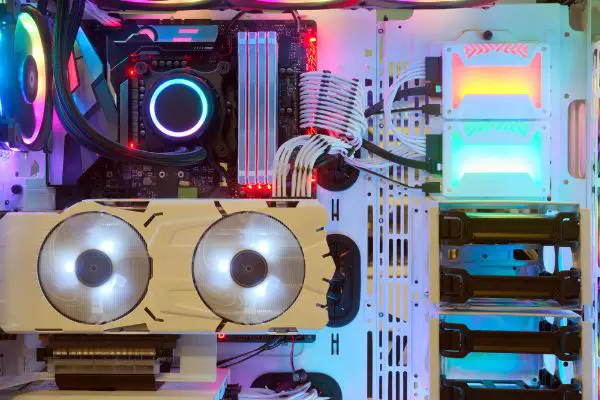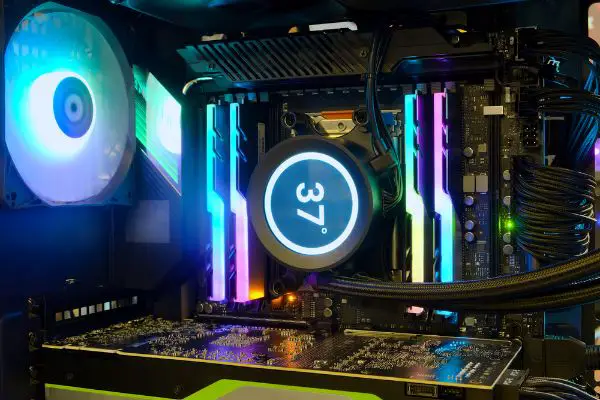Disclaimer: This post may contain affiliate links, meaning we get a small commission if you make a purchase through our links, at no cost to you. For more information, please visit our Disclaimer Page.
The case on most desktop computers is probably one of the first things people think of when it comes to how we view modern PCs. A standard desktop has a tower-like enclosure that keeps all of the computer’s parts together, connected, protected, and functioning properly.
You can consider it the home for the central processing unit, the powerhouse of the computer’s components. Although most personal computer towers are a standard size, you can purchase or build cases that are much larger than the usual form factor.
Some users might wonder whether PC case size matters at all, or how a larger case might help their rigs run more efficiently. We will discuss PC case size, particularly in relation to larger-than-usual enclosures. In doing so, we’ll go over how the size of a case might have an impact on performance and the general life of a desktop system.

Table of Contents
Does the Size of a PC Case Matter?
As with many tech-based questions, both yes and no can apply here. If you’re just going to use a standard OEM desktop rig for everyday tasks, you’ll probably be just fine with the average case size that most computers use.
These cases come with enough room for the standard components, including fans for cooling the hardware that runs hot as it works. They don’t necessarily do the best in terms of airflow, but they tend to be adequate. We will discuss the dynamics of airflow through computer case enclosures in a later section.
While a standard case with the usual size is fine for many applications, you may want to do more than what a typical rig can do. This might include more resource-intensive programs, or you might like to play games that require high-end graphics cards with larger chipsets.
In these cases, PC container size may matter. The types and sizes of the components you might need to install tend to have larger dimensions, and you want to make sure that everything will fit comfortably within the frame you choose for your rig.
In short, PC case size can matter if you need to go beyond the basics that a pre-built machine provides to most users.
If you are a hobbyist who is interested in going for more power, cooling, graphics, memory, or other resources, it is important to keep some things in mind when you’re thinking about larger cases.
Namely, that getting proper measurements for both the case and the components is crucial before you make any purchases or decide to switch between enclosures.
Does Case Size Affect Airflow?
Yes, the size of a case can affect airflow. This can depend on what kinds of cooling methods that you are using. In most instances, users will have at least one fan that blows air around the enclosure to cool the parts off. It is not uncommon to have multiple fans.
There are other things you can install to cool the components of your PC as well. The main reason that case size can affect airflow is in how it controls the paths that the cool air can take, and this includes how restricted the air might be.
It is important to remember here that any case is better than no case when it comes to airflow. Even if all the components are exposed to the open air, they still might not get enough concentrated air to stay cool when they get too hot from working.
An enclosure like a computer tower helps to give the fans a way to keep the air they are blowing centered around the parts that need cooling. Therefore, you can think of a case as something that is able to direct the cooling methods that your desktop might use.
However, it is also true that a case that is too small, or one that has spaces that smaller components can fit into, might affect airflow negatively. You want the air to stay within a particular range in order to provide the maximum cooling features to the components.
A case is great for this kind of thing, but one that is too small might be too restrictive to allow the air to do its job. In these situations, you might be dealing with fans that need to fight hard to push air into smaller, cramped spaces where parts are getting hot.
This can work, but it is not an ideal scenario. One of the main things you want to guard against in any computer is a part overheating, which could lead to catastrophic failure of the entire system.
Are Bigger PC Cases Better?
There is no one answer for this kind of question, and it will vary depending on whom you might ask. In most respects, a bigger PC case might help with airflow, as we’ve discussed. It can also be essential for the kinds or sizes of parts that you want to use in your rig. Beyond these considerations, what is better in terms of case size is up to the user.
Some people want a standard desktop tower, but they also might want to save space on their desks or around their work areas.
For these users, bigger might not necessarily be better, and they have different considerations than other users who might be wondering about flow or what cards they can use.
Similarly, some hobbyists like to experiment with smaller form factors just to see how small they can go. Although you could make an argument that this can restrict airflow,
there are many small cases that are designed to house just a few components in such a way that airflow should not be a problem for these basic setups.
Is a Bigger PC Case Better for Cooling?
In most respects, a bigger PC case tends to be better for cooling. There are a few reasons why this is so, and it is important to keep all of them in mind if you are planning to move your rig from a standard case to a larger one.
First, a bigger PC case usually means that you can use fans that are larger and more powerful than some of the standard ones. As you might expect, bigger fans that generate more power also create stronger, cooler air that they can blow throughout the enclosure to keep the temps down.
Many larger fans are also somewhat slower than their smaller counterparts, meaning that they don’t have to work as hard to get the job done.
A small fan has to do extra work to push air that would be the same volume as that of a larger fan. This consumes more energy and makes your computer’s devices work harder for no benefit.
Second, one of the major features of bigger fans running slower is that they are also quieter. Most smaller fans need to work harder, so they tend to be noisier. If you’re running more than one fan like this, it can create a lot of excess sound that might be bothersome during your work or entertainment time.
This is particularly true if you set your desktop right next to the monitor where you will be doing your tasks. In other words, you can get the best of both worlds with more powerful fans that run slower and quieter when you have a bigger case.
Thirdly, a larger case will let you use more efficient heat sinks. This component is what absorbs excess heat and transfers it in a way that helps it dissipate from the case rather than build up inside it.
Having a larger sink means that your computer has more surface area over which it can pull cool air. Just like with bigger, better fans, this can result in cooling properties that are more effective at keeping the temps for your parts down to manageable levels.
Can a PC Case Be Too Big?
This is another question that is mostly dependent on the owner, but it is technically true that a PC can be too big. The most common way this might be so is when you consider how much space you have to store a computer tower in your chosen work area.
You might do other things at your station, and it is a given that you’ll need a monitor and a keyboard along with your tower to do some work. Additionally, you can put your case on a desk or under it, but you may have other things surrounding the space that make one position more favorable than another.
You’ll want to plan to make sure any case can fit inside whatever corner or space you have planned for it. Along with that, it could depend on how your components are sitting within the enclosure itself.
You’ll want to make sure everything is stable, but you also need to ensure that cords and connectors can attach to where they need to go easily.
If some things are too short, they might now work in a larger case. However, this is not usually an issue, and you can buy extension cords to solve some of the problems here.

Does PC Case Size Affect Performance?
The size of a desktop computer’s case can affect its overall performance. While this is not necessarily a given, it can happen. This usually depends on what setup you are running.
We’ve already discussed overheating in smaller cases, and how it is largely thanks to restricted airflow or the use of smaller fans that cannot generate enough power. This is how the size of your case might impact your rig directly, but there is another way that it does so indirectly.
A case that is too small limits what hardware you can run. This is true both as a matter of the physical space necessary to contain the components you might like to use, and it is true in the sense that bigger, more powerful parts can overheat if not cooled properly.
More space allows for cards and other things that can boost performance. In turn, it also allows for more effective cooling methods to let those parts run at good levels. In these ways, case size can play a role in performance.
Conclusion
A desktop computer’s case might be one of the first major parts you think of, but its size isn’t necessarily something that you might consider. However, bigger cases give you the opportunity to experiment with larger or more numerous options for cooling things down. Additionally, they can give you room to play with different components that might allow you to run bigger, better programs and games as you upgrade your system.
